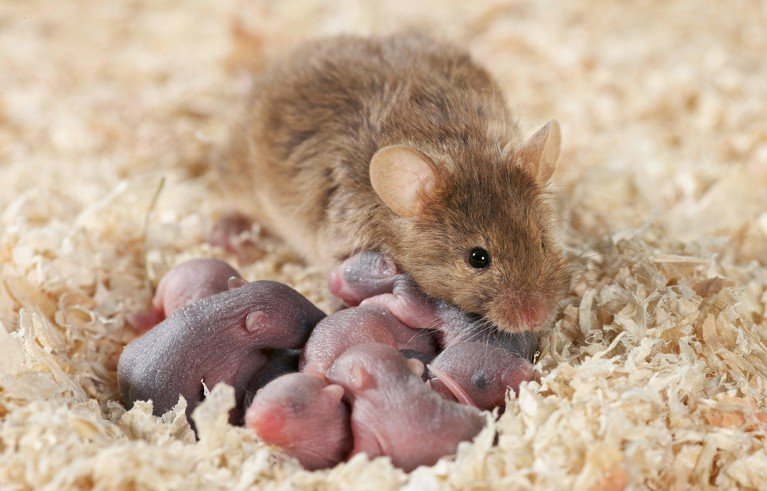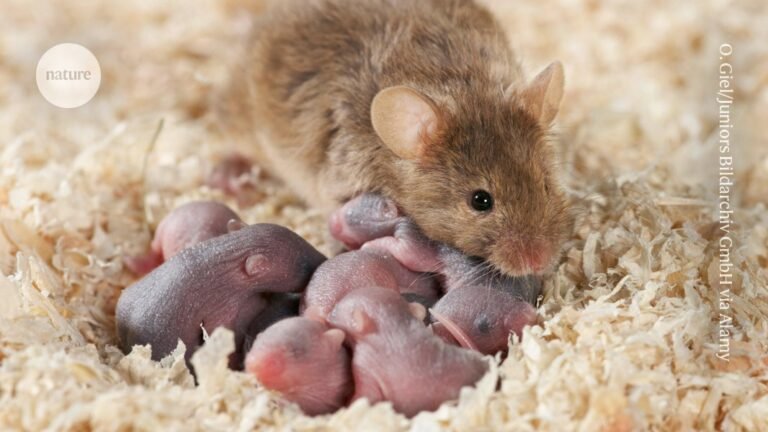
Specific neurons in the brains of infant mice are active when they interact with their mother.Credit: O. Giel/Juniors Bildarchiv GmbH via Alamy
Researchers have identified neurons in the brains of baby mice that enable them to form a unique, strong bond with their mother in the first few days of life.
Stimulating these neurons in mouse pups that had been separated from their mother could mimic the soothing effect of their mother’s presence, and reduced behaviours associated with stress.
The findings, published today in Science1, offer fresh clues about the formation of the mother–infant bond in mammals, and could help researchers to better understand how brain development influences behaviour.
“We know very little about how the brains of infants make sense of their social world,” says study co-author Marcelo Dietrich, a neurobiologist at Yale University in New Haven, Connecticut. “When I started my lab ten years ago, and I wanted to study this kind of stuff, people said it was delusional. It will fail. It’s too difficult.” Now, “we show that it’s possible: one can do rigorous science and try to understand these mechanisms that are potentially very important for development and health”.
“I see these neurons as the ‘I feel good with mommy’ neurons,” says Catharine Dulac, a neuroscientist at the University of Harvard in Cambridge, Massachusetts. “The features that [they] discovered provide some framework to think about humans.”
Bonding in the brain
Dietrich and his team studied nursing mouse pups that were between 16 and 18 days old. They used live imaging techniques to record activity in the zona incerta (ZI), a thin layer of grey matter located below the thalamus, while the animals interacted with their mother.
The ZI processes visual, auditory and sensory information. During early development, it forms connections with various brain regions, some of which retract after weaning. The researchers noticed that when mouse pups interacted with their mother, neurons in their ZI that produce a hormone called somatostatin were active. Somatostatin is involved in regulating many other hormones and processes throughout the body.
To test whether the activity in these neurons was specific to mother–infant interactions, the authors observed the brains of mouse pups while they spent time with other, unfamiliar mice, including other nursing females, non-nursing females and adult males. They also tested whether the neurons responded to control objects — rubber ducks and furry, mouse-shaped cat toys. “We just bought hundreds of those from Amazon,” says Dietrich.
The somatostatin neurons did not respond to the toys, but were activated to some extent while the mouse pups interacted with unrelated adults, siblings and other pups around the same age. But the response was not as strong as with their mother — suggesting that these neurons have a key role in the development of the unique mother–infant bond.
“How these neurons understand that this is mom rather than somebody else is very intriguing,” says Dulac.
The researchers also found that activating these neurons reduced stress responses in 11-day-old pups that were separated from their mother: these pups cried less and had lower levels of the stress hormone corticosterone than did pups in which the neurons were not activated. Isolated pups with their somatostatin neurons activated also learnt to form positive associations with certain smells, similarly to how they did with their mother present.
Shifting circuits
Although the study provides evidence that somatostatin neurons in the ZI play a part in bonding and stress reduction in infant mice, the authors note that studies in adults have shown different results.
Activating these neurons in adult mice increased responses associated with anxiety2 and fear3. “That’s really quite striking,” says Johannes Kohl, a neuroscientist at the Francis Crick Institute in London. “It raises the wider question whether they are truly the same cells between neonates or preweaning mice and adults, or whether they’re the same cells and they just radically change their circuit integration, and hence role.”
The authors say that these neural circuits might undergo changes as the mice age, to help them adapt to different pressures throughout their lives. “Longitudinal tracking of these neurons across development might be very exciting to understand how they then assume their adult role,” says Kohl.

